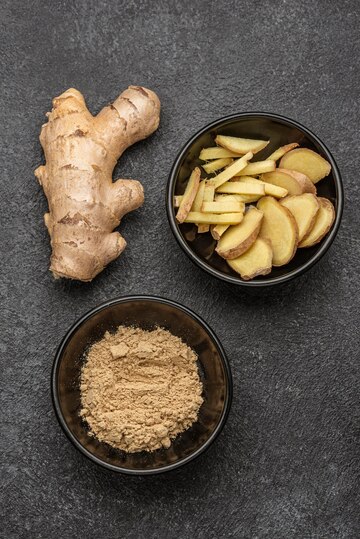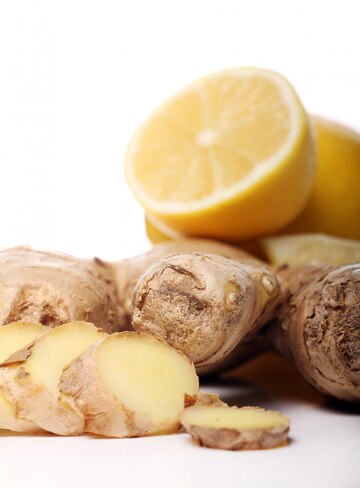Ginger: The Superfood You Need to Know About
Ginger, a staple in kitchens worldwide, is far more than just a spice used to add flavor to dishes. This humble root has been celebrated for thousands of years for its medicinal properties, and today, it is experiencing a renaissance as one of the most powerful superfoods available. From boosting immunity to aiding digestion and reducing inflammation, ginger is a versatile and potent natural remedy that can improve overall health and well-being.
The History and Origins of Ginger

Ginger (Zingiber officinale) is a flowering plant whose rhizome, or underground stem, is commonly used as a spice and in traditional medicine. Native to Southeast Asia, ginger has been used for over 5,000 years in various cultures, including Chinese, Indian, and Middle Eastern societies. Ancient texts from these regions describe ginger as a healing herb, capable of treating a wide range of ailments.
In traditional Chinese medicine, ginger was often prescribed to help with digestion and to treat colds and flu. In Ayurvedic medicine, it was used to balance the body’s energies, known as doshas, and to treat everything from nausea to arthritis. The Romans introduced ginger to Europe, where it became a popular spice in medieval cuisine and medicine.
The Nutritional Profile of Ginger
Ginger is not only rich in flavor but also packed with essential nutrients and bioactive compounds that contribute to its health benefits. A 100-gram serving of fresh ginger root contains:
- Calories: 80
- Carbohydrates: 17.8 grams
- Dietary Fiber: 2 grams
- Protein: 1.8 grams
- Vitamin C: 5 milligrams
- Vitamin B6: 0.16 milligrams
- Magnesium: 43 milligrams
- Potassium: 415 milligrams
- Manganese: 0.22 milligrams
The key active compounds in ginger are gingerol and shogaol, which are responsible for its distinctive spicy flavor and many of its medicinal properties. Gingerol, in particular, is a potent antioxidant and anti-inflammatory agent that has been the subject of numerous studies.
Health Benefits of Ginger: Why You Should Incorporate It Into Your Diet
1. Anti-Inflammatory and Antioxidant Properties
One of the most well-known benefits of ginger is its anti-inflammatory properties. Chronic inflammation is a major contributor to a wide range of health issues, including heart disease, diabetes, and cancer. The gingerol in ginger acts as a powerful anti-inflammatory agent, helping to reduce inflammation at the cellular level.
Moreover, ginger is rich in antioxidants, which help neutralize harmful free radicals in the body. This antioxidant effect can protect cells from damage, slow the aging process, and reduce the risk of chronic diseases.
2. Digestive Health
Ginger has long been used as a remedy for digestive issues, and modern science supports its effectiveness in this area. Ginger can help stimulate saliva, bile, and gastric juice production, which are essential for proper digestion. It is particularly effective in treating nausea and vomiting, whether from motion sickness, pregnancy (morning sickness), or chemotherapy.
Recent studies have also shown that ginger can help prevent and treat indigestion. By speeding up the emptying of the stomach, ginger can reduce the discomfort associated with bloating and gas.
3. Immune System Support
With the growing emphasis on immune health, especially in the wake of the COVID-19 pandemic, ginger has become a go-to remedy for boosting the immune system. Its antiviral, antibacterial, and antifungal properties make it an excellent natural defense against infections.
Ginger can also help reduce the severity of cold and flu symptoms by acting as a natural decongestant and soothing a sore throat. The anti-inflammatory properties of ginger further enhance its ability to support the immune system, making it a valuable addition to any diet.
4. Pain Relief

Ginger has been shown to be effective in reducing various types of pain, particularly those associated with inflammation. For example, studies have found that ginger can help reduce muscle pain and soreness after exercise, as well as the symptoms of osteoarthritis, a common degenerative joint condition.
A 2020 study published in the Journal of Pain Research found that participants who took ginger supplements experienced significant reductions in muscle pain following intense physical activity. Similarly, another study in Arthritis & Rheumatism found that ginger extract was as effective as ibuprofen in reducing pain and stiffness in patients with osteoarthritis of the knee.
5. Heart Health
Ginger’s anti-inflammatory and antioxidant properties also contribute to heart health. Chronic inflammation is a known risk factor for cardiovascular diseases, and by reducing inflammation, ginger can help lower the risk of heart disease.
Furthermore, ginger has been shown to improve blood circulation and reduce blood pressure, both of which are critical for maintaining a healthy heart. Some studies suggest that ginger may also help lower cholesterol levels and prevent the formation of blood clots, reducing the risk of stroke.
6. Weight Loss and Metabolic Health
In recent years, ginger has gained popularity as a natural aid for weight loss and metabolic health. Research has shown that ginger can help increase thermogenesis, the process by which the body burns calories to produce heat. This thermogenic effect can boost metabolism and promote fat loss.
Additionally, ginger has been found to help regulate blood sugar levels, making it a valuable tool for managing diabetes and preventing metabolic syndrome. By improving insulin sensitivity and reducing blood sugar spikes, ginger can help maintain stable energy levels and reduce the risk of diabetes-related complications.
The Latest Trends in Ginger Consumption
As more people become aware of the health benefits of ginger, its popularity has soared, leading to innovative ways to incorporate this superfood into everyday life. Here are some of the latest trends in ginger consumption:
1. Ginger Shots
Ginger shots have become a popular health trend, particularly among those looking for a quick and convenient way to boost their immune system. These concentrated doses of ginger juice, often combined with lemon and honey, are packed with antioxidants and anti-inflammatory compounds. Ginger shots are available in many health food stores, or they can be made at home with fresh ginger root.
2. Ginger Tea
Ginger tea is a classic way to enjoy the benefits of ginger. It is soothing, warming, and perfect for cold winter days or as a remedy for digestive discomfort. Ginger tea is also commonly used to relieve symptoms of colds and flu. Many people are now experimenting with different combinations, such as ginger with turmeric or adding fresh ginger to green tea, to enhance the health benefits.
3. Ginger-Infused Water
For those who find the taste of ginger too strong, ginger-infused water is a milder option. Simply add slices of fresh ginger to a pitcher of water and let it infuse overnight. This refreshing drink not only hydrates but also delivers a subtle dose of ginger’s health benefits throughout the day. Some people also add lemon or mint for added flavor and health benefits.
4. Ginger in Cooking
Ginger has always been a staple in cooking, but its use has expanded beyond traditional dishes. Today, ginger is being used in everything from smoothies and salads to desserts and marinades. Its versatility in both sweet and savory dishes makes it a favorite ingredient for health-conscious cooks. For example, ginger can be added to stir-fries, soups, and even baked goods like gingerbread cookies and cakes.
5. Ginger Supplements
For those who want to ensure they are getting a consistent and potent dose of ginger, supplements are an option. Ginger supplements are available in various forms, including capsules, powders, and extracts. These supplements are often used to treat specific health conditions, such as arthritis or digestive issues, under the guidance of a healthcare professional.
How to Incorporate Ginger into Your Diet
Incorporating ginger into your diet is easy, thanks to its versatility. Here are some simple ways to enjoy the benefits of ginger:
1. Add Fresh Ginger to Smoothies:
A small piece of fresh ginger can add a spicy kick to your morning smoothie while also boosting your immune system and aiding digestion.
2. Use Ginger in Cooking:
Grate fresh ginger into stir-fries, soups, or marinades for a burst of flavor and added health benefits. Ginger pairs well with garlic, soy sauce, and citrus flavors.
3. Make Ginger Tea:
Boil a few slices of fresh ginger in water for 10 minutes to make a soothing tea. Add honey and lemon for extra flavor and health benefits.
4. Try Ginger Shots:
Take a daily ginger shot for a concentrated dose of its health-boosting properties. You can find these pre-made in stores or make your own at home.
5. Use Ginger Powder:
Ginger powder is a convenient way to add ginger to your diet. Sprinkle it on oatmeal, yogurt, or baked goods for a hint of spice and added nutrition.
Conclusion: The Power of Ginger
Ginger is more than just a spice; it is a powerful superfood with a wide range of health benefits. From reducing inflammation and boosting the immune system to aiding digestion and promoting heart health, ginger is a natural remedy that deserves a place in every diet. With the growing interest in natural and holistic approaches to health, ginger has become a popular choice for those looking to improve their well-being naturally.
As you explore ways to incorporate ginger into your daily routine, remember that moderation is key. While ginger is generally safe for most people, excessive consumption can lead to side effects such as heartburn or digestive discomfort. If you are pregnant, nursing, or have any medical conditions, it is always a good idea to consult with a healthcare provider before making significant changes to your diet.
For more health tips and information on superfoods like ginger, check out top health blogs like MindBodyGreen and Healthline, which offer expert advice on how to live a healthier, more balanced life.
